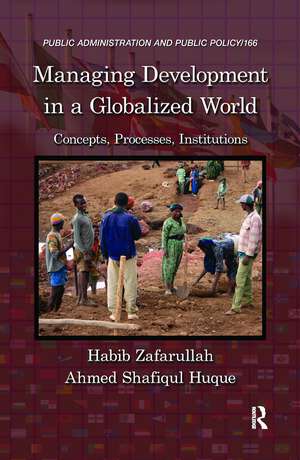Managing Development in a Globalized World: Concepts, Processes, Institutions: Public Administration and Public Policy
Autor Habib Zafarullah, Ahmed Shafiqul Huqueen Limba Engleză Hardback – 13 mar 2012
The authors argue that the application of innovative development techniques and best practices is essential for obtaining optimum results in meeting the needs of society. They examine the style of managing development with a new perspective that links the phenomenon with changing demands and the interplay of internal/external actors and a host of stakeholders. An exploration of key sectors in development provides clear comprehension of problems and solutions.
A careful synthesis of theoretical/conceptual and empirical literature, the book assesses real-world situations and provides insight into the operational dynamics of development policies, programs, and institutions. It focuses on goals, values, and dynamics of development management that are undergoing rapid changes and continue to be enhanced to alleviate poverty and improve living standards in an era of globalization and inter-regional and inter-institutional synergies. It highlights best practices essential for the efficient and effective delivery of human development services that are designed and put in place to obtain optimum results in meeting the needs of society.
Din seria Public Administration and Public Policy
- 8%
 Preț: 391.59 lei
Preț: 391.59 lei -
 Preț: 387.96 lei
Preț: 387.96 lei - 9%
 Preț: 572.94 lei
Preț: 572.94 lei - 8%
 Preț: 430.25 lei
Preț: 430.25 lei - 8%
 Preț: 428.07 lei
Preț: 428.07 lei - 9%
 Preț: 2247.96 lei
Preț: 2247.96 lei - 18%
 Preț: 1491.92 lei
Preț: 1491.92 lei - 25%
 Preț: 1198.87 lei
Preț: 1198.87 lei - 24%
 Preț: 617.83 lei
Preț: 617.83 lei - 22%
 Preț: 458.73 lei
Preț: 458.73 lei - 18%
 Preț: 1812.76 lei
Preț: 1812.76 lei -
 Preț: 472.06 lei
Preț: 472.06 lei - 44%
 Preț: 501.80 lei
Preț: 501.80 lei - 22%
 Preț: 416.78 lei
Preț: 416.78 lei - 18%
 Preț: 2377.47 lei
Preț: 2377.47 lei - 15%
 Preț: 615.12 lei
Preț: 615.12 lei - 15%
 Preț: 606.04 lei
Preț: 606.04 lei - 25%
 Preț: 683.99 lei
Preț: 683.99 lei - 15%
 Preț: 503.94 lei
Preț: 503.94 lei - 25%
 Preț: 830.92 lei
Preț: 830.92 lei - 23%
 Preț: 457.91 lei
Preț: 457.91 lei - 25%
 Preț: 682.76 lei
Preț: 682.76 lei - 22%
 Preț: 352.95 lei
Preț: 352.95 lei - 18%
 Preț: 1557.29 lei
Preț: 1557.29 lei - 25%
 Preț: 1063.77 lei
Preț: 1063.77 lei -
 Preț: 325.14 lei
Preț: 325.14 lei - 25%
 Preț: 750.25 lei
Preț: 750.25 lei - 15%
 Preț: 564.96 lei
Preț: 564.96 lei - 15%
 Preț: 674.85 lei
Preț: 674.85 lei - 18%
 Preț: 1511.65 lei
Preț: 1511.65 lei - 18%
 Preț: 702.31 lei
Preț: 702.31 lei - 22%
 Preț: 331.18 lei
Preț: 331.18 lei - 18%
 Preț: 791.91 lei
Preț: 791.91 lei - 15%
 Preț: 703.08 lei
Preț: 703.08 lei - 18%
 Preț: 796.64 lei
Preț: 796.64 lei - 25%
 Preț: 500.68 lei
Preț: 500.68 lei - 24%
 Preț: 701.94 lei
Preț: 701.94 lei - 25%
 Preț: 864.47 lei
Preț: 864.47 lei - 22%
 Preț: 467.74 lei
Preț: 467.74 lei - 25%
 Preț: 501.45 lei
Preț: 501.45 lei - 18%
 Preț: 912.47 lei
Preț: 912.47 lei - 15%
 Preț: 598.05 lei
Preț: 598.05 lei - 26%
 Preț: 1016.07 lei
Preț: 1016.07 lei - 9%
 Preț: 1192.62 lei
Preț: 1192.62 lei - 18%
 Preț: 948.98 lei
Preț: 948.98 lei - 18%
 Preț: 2210.92 lei
Preț: 2210.92 lei - 18%
 Preț: 745.52 lei
Preț: 745.52 lei - 15%
 Preț: 492.54 lei
Preț: 492.54 lei - 18%
 Preț: 707.10 lei
Preț: 707.10 lei
Preț: 806.34 lei
Preț vechi: 983.34 lei
-18% Nou
Puncte Express: 1210
Preț estimativ în valută:
154.33€ • 159.05$ • 130.29£
154.33€ • 159.05$ • 130.29£
Carte tipărită la comandă
Livrare economică 01-15 martie
Preluare comenzi: 021 569.72.76
Specificații
ISBN-13: 9781420068375
ISBN-10: 1420068377
Pagini: 528
Ilustrații: 12 b/w images and 11 tables
Dimensiuni: 156 x 234 x 33 mm
Greutate: 1.14 kg
Ediția:New.
Editura: Taylor & Francis
Colecția Routledge
Seria Public Administration and Public Policy
Locul publicării:Oxford, United Kingdom
ISBN-10: 1420068377
Pagini: 528
Ilustrații: 12 b/w images and 11 tables
Dimensiuni: 156 x 234 x 33 mm
Greutate: 1.14 kg
Ediția:New.
Editura: Taylor & Francis
Colecția Routledge
Seria Public Administration and Public Policy
Locul publicării:Oxford, United Kingdom
Public țintă
Academic, Postgraduate, Professional, Professional Practice & Development, and UndergraduateCuprins
Concepts, principles & Processes. Contextualizing Development in a Globalized World. Development and its Dimensions. The State in Development. The Inclusive Developmental State and Institutions of Development. The Governance of Development. Managing and Networking Development. Development Policy Making. Implementing Policy and Planning Development. Development Issues. Decentralization and Intergovernmental Relations. Management Reforms and Capacity Building. Participation and Empowerment. Rural Development and Microfinance. Health and Population Management. Education and Advocacy. Environmental Protection. Managing Development: Future Directions. Bibliography. Index.
Notă biografică
Habib Zafarullah (University of New England, Australia) (Author) , Ahmed Shafiqul Huque (McMaster University, Canada) (Author)
Descriere
This book sheds light on the concepts, processes, strategies, and institutions of development in a rapidly changing world, incorporating ideas and interpretations that have previously been neglected or given inadequate attention in the discourse on developing countries. The authors examine how to manage development with a new perspective that links the phenomenon with changing demands and the interplay of internal/external actors and a host of stakeholders. They assess real-world situations and provide insight into the operational dynamics of development policies, programs, and institutions.













